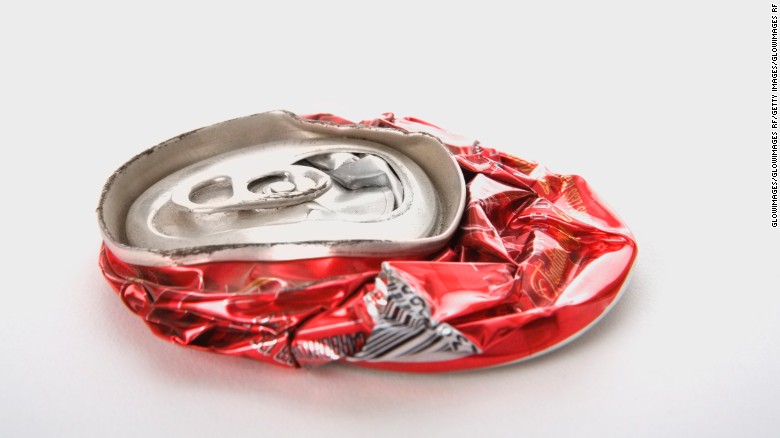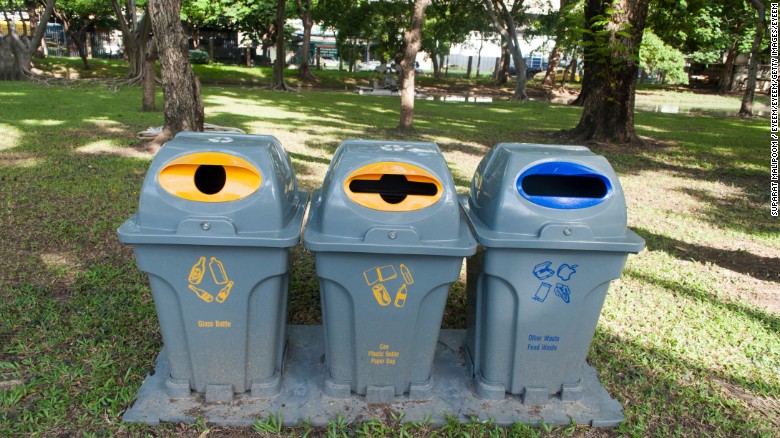Yes, absolutely. Which is sad. Do we really need to be led to do the right thing? We recycle when we feel like it or when the setting is just right? By now we should all feel compelled to cut waste and reuse/repurpose all of our leftovers.
Changing human is so very hard. Yet, without full support from all, we will fall short on our many sustainable goals.
Can psychology influence the way we recycle?
(CNN)Have you ever had your name spelled wrong on a disposable cup in a coffee shop?
If you have -- and you probably have -- chances are you did not recycle that cup.
That's what a team of psychologists realized when they ran a study using cups with names spelled intentionally wrong, disguised as a juice tasting. People were significantly more likely to recycle their cup when their names were spelled correctly: 48% did, as opposed to 26% of those who had no name at all and a paltry 24% of those who had a misspell.
"We are averse to trashing something that is tied to our identity," said Jennifer Argo of the University of Alberta, one of the authors of the study, "as it would be conceptually similar to trashing a part of the self, which makes people more likely to recycle."
The whole problem
In another study, Argo and co-author Remi Trudel of Boston University discovered that when an object loses its original shape, its chances of being recycled collapse.
A crushed can, for example, is considered damaged -- as such, it's more likely to end up in the trash can than in the recycling bin: "When items become damaged, they differ from the 'prototype' or ideal version of that product, and as a result, they are perceived as being less useful. As consumers, we tend to equate things that are useless with garbage," Argo said.
Small bits of paper also usually end up in the trash can: People are less likely to recycle them even when the total quantity of small pieces is double that of a single regular sheet.
But just ask people what the bits of paper could be useful for, and 80% of the time, they will recycle it, showing how quickly we can shift our perception.
"Things that are useful are recycled; they still serve a purpose. In fact, Coke ran a campaign shortly after our first paper on the topic, showing a crushed can and emphasizing it was still recyclable. Educating consumers through promotional techniques as well as highlighting identity would increase recycling," Argo said.
The power of influence
A big push toward recycling can come from social norms, or unwritten rules on how to behave.
In 1990, psychologist Robert Cialdini of Arizona State University and his colleagues set up an experiment in a car park in Texas. As people walked back to their cars, they had an accomplice walk in front of them and drop a large flier on the floor. Half the time, this happened in a spotlessly clean parking lot. The other half, the lot was already full of litter.
Once they go to their car, the unsuspecting subjects found a similar flier obstructing the view on their windshield. What did they do with it?
Out of those who saw the confederate litter in the littered environment, 54% threw their flier on the floor: When exposed to a prevalent behavior, we follow suit.
Conversely, only 6% of those who saw the accomplice litter in the clean environment did so themselves: The gesture stood out, making it easy to disapprove of.
Cialdini used these findings to craft a series of TV ads to increase recycling in Arizona. In the ads, people who already recycled spoke approvingly of it while disparaging a single individual in these scene who did not recycle. A 25% increase in recycling was recorded in communities exposed to the ads.
Generally speaking, we don't like to be outcasts; we want to fit in. In 2008, Cialdini and his colleagues Vladas Griskevicius and Noah Goldstein brought their attention to hotel towels, rearranging the wording of the signs that ask hotel guests to reuse their towels.
By simply replacing a standard ecological message with social norms -- saying most guests in the hotel reused their towels -- they witnessed a 26% increase in reuse. When they specifically referenced the guests who had previously stayed in the very same room, the increase shot up to 33%: the closer the influence, the greater its effect.
These devices, commonly called nudges, are also used by governments to entice desirable action across many areas, from tax returns to public health.
"I am confident that influence techniques can be used to affect recycling action, too," Cialdini told CNN.
"My own research has demonstrated the power of one influence technique, the presentation of social norms regarding recycling, to significantly change recycling intentions and behavior."
It matters a 'hole' lot
Even simpler things like the shape of a lid can affect recycling behaviors, which is why bins tend to have differently shaped holes for different items such as bottles, cans or paper.
In a 2008 study titled "It matters a hole lot," two sets of three bins where placed throughout an academic building. One set had no lids, while the other had a flap lid for trash, a lid with a 6-inch hole for recyclables and a lid with a narrow slit for paper.
The results were astonishing: Not only did the shaped lids increase correct recycling by 34%, but the amount of contaminants, such as food, in the recycling stream collapsed by 95%.
The key might be in the concept of "affordance," which is a property of an object that tells us how to use it. A hanging string, for example, affords pulling; a handle on a door can afford -- sometimes ambiguously -- pushing or pulling.
The shaped lids provide affordance in a much stronger form than just a label and require people to pay attention to what they're doing. The open lids won't stop anyone who's distracted from just tossing their trash into a random bin.
Well-designed waste bins, remark the study authors Sean Duffy and Michelle Verges, can thus be crucial for recycling: "Something that is nothing -- a hole -- can dramatically increase environmentally responsible behaviors."
Recycling gone bad
The act of depositing an item into a recycling bin doesn't make it disappear -- nor guarantee that it won't end up in a landfill -- yet it's quite enough to influence our decisions. Sometimes for the worse.
In a study titled "Recycling gone bad," participants were split into two groups, given sheets of paper and asked to rate a new brand of scissors. One group only had a trash bin in the room, the other both a trash bin and a recycling bin. This group used far more paper to "test" the scissors.
A similar finding came from a follow-up study involving paper towels in a restroom. A bin marked with a recycling symbol created a significant uptick in consumption.
If the option to recycle is present, it seems, we use more resources: "We think this happens because people think about recycling in terms of its environmental benefits, with less awareness that there are also environmental costs," said Jesse R. Catlin of Sacramento State University, one of the authors of the study.
"This view may allow people to rationalize to themselves that consuming more is OK, as long as they recycle."
If money is thrown into the mix, behavior changes again, according to a study from the University of British Columbia.
Two groups of students was again tasked with cutting up paper. They could then discard it into a trash bin within the room or use a recycling bin outside it. The group that was given an hourly wage as compensation for the test, as opposed to a fixed wage, recycled less: "Putting a price tag on time leaves individuals to focus on their own needs and goals, as opposed to the needs and goals of others, including the environment," said Ashley Whillans, lead author of a paper on the study.
When time is money, we care less about the planet.
"People's behavior can be sensitive to a variety of different factors," said Catlin.
"Whether it's simply the availability of a nearby recycling bin or the signage applied to the bins themselves, the research seems clear that consumption levels and recycling decisions are not set in stone and therefore subject to change based on the particular situation."




No comments:
Post a Comment